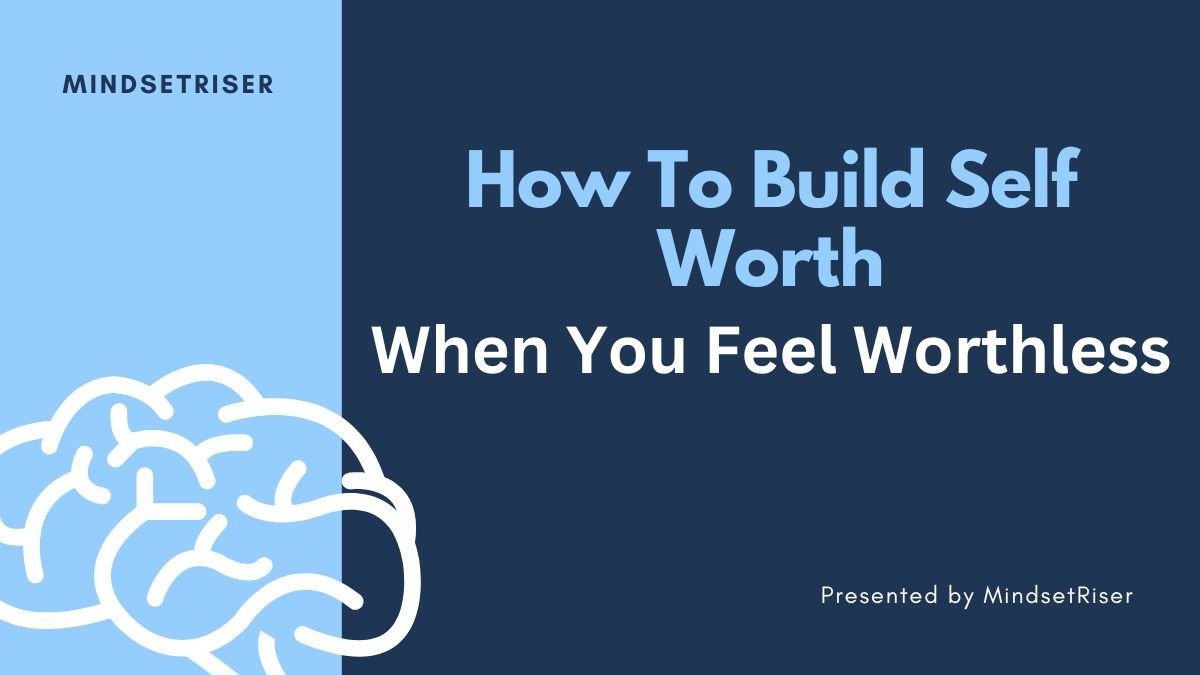How to Build Self-Worth (When You Feel Worthless)
How to Build Self-Worth (When You Feel Worthless)
It’s easy to feel like you’re not enough when life gets tough, or when challenges make you question your value. Self-worth is something that we all struggle with at times, but it is also something we can actively build and nurture. Building self-worth isn’t about instant fixes, but rather a gradual process of changing your mindset, shifting your beliefs, and taking positive actions that reinforce your value.
If you’re struggling with feelings of worthlessness, don’t worry—you’re not alone. In this article, we’ll explore how to rebuild and strengthen your self-worth, even when it feels like everything is working against you.
What is Self-Worth?
Self-worth refers to how you view yourself and how much value you place on your own life and abilities. It’s the foundation of self-esteem, which impacts how you treat yourself and how you allow others to treat you. Having a strong sense of self-worth means knowing that you are worthy of love, respect, and happiness—no matter what challenges or setbacks you face.
However, when your self-worth is damaged, you may feel inadequate, unlovable, or insignificant. These feelings can lead to a variety of emotional struggles, including anxiety, depression, and difficulties in personal relationships.
Why Do We Struggle with Self-Worth?
Many factors contribute to feelings of low self-worth, and understanding these can help you begin to heal:
- Past Trauma: Childhood experiences, negative relationships, or past mistakes can leave emotional scars that affect how you view yourself.
- Societal Pressures: Society often places emphasis on external achievements, appearances, and social status, which can lead us to feel inadequate if we don’t measure up to these ideals.
- Comparison to Others: Constantly comparing yourself to others, especially on social media, can make you feel like you’re not doing enough or not being enough.
- Negative Self-Talk: Our internal dialogue often shapes our self-worth. If you constantly criticize yourself or focus on your flaws, it can be hard to build a positive view of yourself.
How to Build Self-Worth (When You Feel Worthless)
Rebuilding self-worth is a journey, but it’s a journey that you can take step by step. Here are some powerful strategies to help you rebuild your self-worth:
1. Challenge Negative Self-Talk
Negative self-talk is a major obstacle to building self-worth. When you constantly tell yourself that you’re not good enough, unworthy, or incapable, it becomes a self-fulfilling prophecy.
How to Change Your Self-Talk:
- Recognize the Negative Thoughts: Start by paying attention to your thoughts. When you notice negative self-talk, challenge it.
- Replace Negativity with Positivity: Replace thoughts like “I’m a failure” with affirmations like “I’m doing the best I can, and I’m learning from my experiences.”
- Practice Self-Compassion: Be kind to yourself. Understand that everyone has setbacks, and mistakes are part of growth, not evidence of worthlessness.
2. Set Small, Achievable Goals
When you’re feeling worthless, it’s important to break things down into smaller, more manageable steps. Setting small, achievable goals and accomplishing them can give you a sense of purpose and success, reinforcing your self-worth.
How to Set Achievable Goals:
- Start Small: Begin with goals that are easy to accomplish. This could be something as simple as making your bed or getting out of bed at a certain time.
- Celebrate Every Achievement: Take time to celebrate each small victory, even if it seems insignificant. Recognizing your progress boosts your self-esteem.
- Gradually Increase the Difficulty: Once you feel comfortable with small goals, increase the complexity to challenge yourself further.
3. Practice Self-Care
Self-care isn’t just about physical health; it’s also about mental and emotional well-being. When you’re struggling with low self-worth, taking time to care for yourself can remind you that you’re deserving of attention, love, and kindness.
How to Practice Self-Care:
- Take Care of Your Body: Regular exercise, healthy eating, and getting enough rest are all important for maintaining physical health, which directly affects your mood and mindset.
- Engage in Activities You Enjoy: Doing things that make you happy—whether it’s reading, painting, walking, or any other hobby—can help you reconnect with your true self.
- Pamper Yourself: Treat yourself to something nice, whether it’s a warm bath, a favorite meal, or a relaxing break.
4. Surround Yourself with Positive People
The people you surround yourself with can have a significant impact on your sense of self-worth. Negative or toxic relationships can drain your energy and reinforce feelings of inadequacy. On the other hand, supportive, encouraging people can help you see your value and lift you up when you’re feeling down.
How to Build a Supportive Network:
- Limit Time with Negative People: If you have friends or family members who constantly bring you down, it may be time to set boundaries or distance yourself from them.
- Seek Supportive Relationships: Build relationships with people who value you for who you are, not just for what you do. Surround yourself with those who encourage and uplift you.
- Seek Professional Help: If you’re struggling with deep feelings of worthlessness, talking to a therapist or counselor can provide valuable insight and support.
5. Reflect on Your Strengths and Achievements
When you feel worthless, it’s easy to forget all the positive qualities that make you unique. Regularly reflecting on your strengths and past achievements can help you recognize your inherent value and remind you that you are worthy.
How to Reflect on Your Strengths:
- Keep a Gratitude Journal: Write down things you’re thankful for each day, including your strengths and accomplishments.
- Create a Strengths List: Make a list of your skills, talents, and positive attributes. This will help you remember that you have a lot to offer.
- Revisit Your Achievements: Look back at past successes, no matter how small they seem. This could include things you’ve accomplished at work, school, or in your personal life.
6. Let Go of Perfectionism
Perfectionism can feed into feelings of worthlessness because it makes you feel like you’re never good enough. In reality, no one is perfect—and striving for perfection often leads to frustration and burnout.
How to Let Go of Perfectionism:
- Embrace Imperfection: Accept that mistakes are part of the learning process and don’t define your worth. You don’t need to be perfect to be valuable.
- Set Realistic Expectations: Instead of trying to achieve flawless results, aim for progress and growth. Celebrate your efforts, even if the outcome isn’t perfect.
- Practice Self-Compassion: Be gentle with yourself when you fall short of your goals. Recognize that failure is just another step on the path to success.
7. Learn to Say No
Many people with low self-worth struggle with people-pleasing behaviors. You may feel like you have to say “yes” to everything in order to be liked or accepted. However, saying yes to everything can lead to burnout and resentment. Learning to say no is an important part of setting boundaries and preserving your self-worth.
How to Say No Without Guilt:
- Understand Your Limits: Recognize that you can’t do everything. Saying no helps you protect your energy and time for things that truly matter.
- Be Assertive: Politely but firmly decline requests that don’t align with your values or priorities.
- Practice Self-Respect: Saying no is an act of self-respect and reinforces that your time and energy are valuable.
8. Practice Gratitude
When you’re struggling with low self-worth, it can be hard to see the good in your life. Practicing gratitude helps shift your focus from what’s lacking to what you have, reinforcing positive feelings about yourself and your life.
How to Practice Gratitude:
- Start a Daily Gratitude Practice: Every day, write down at least three things you’re grateful for. This simple practice can help you shift your mindset and appreciate the positive aspects of your life.
- Focus on Small Wins: Celebrate small successes, whether it’s getting through a tough day or making progress toward a personal goal.
Final Thoughts
Building self-worth when you feel worthless is possible—it takes time, patience, and consistent effort. By practicing self-compassion, setting boundaries, and focusing on your strengths, you can rebuild your sense of value and learn to appreciate yourself.
Remember, you are worthy—no matter what challenges or setbacks you face. Take it one step at a time, and allow yourself to heal and grow.

